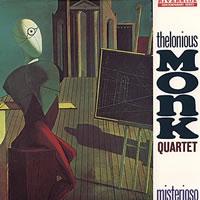Acoustic Sounds' Third Series of 180 gram, 45rpm Double LPs Doesn't MONK-ey Around!
Analogue Productions’ third series of limited edition 45rpm 180 gram “twofers” will surely be as popular as the first two sets, with key titles selling out and fetching big bucks on the used market. The musically well-balanced offerings from the Riverside, Pablo and Prestige catalogs controlled by Fantasy Records include The Tony Bennett Bill Evans Album, Bill Evans’ How My Heart Sings and Interplay, Miles Davis’s Workin’ and many other long sought after jazz and blues titles.
Try finding a copy of Waltz For Debby or some of the other “must have” titles from the first series. Meanwhile, last time I looked, there were still copies of Monk’s Brilliant Corners with Sonny Rollins, which I figured would sell out quickly. So go figure. I’ve had an original since 1964 when Riverside went bust and they were selling the entire catalog cut-out for $1.98 apiece at The Cornell Campus Bookstore. Too bad $1.98 was a decent chunk of change to a student back then or I would have bought them all!
That said, to my ears, overall, the Analog Productions 45rpm reissue of Brilliant Corners sounds much better than the original (though it costs much more).
The same can safely be said about Misterioso, one of the stellar titles from the third series. Recorded live at The Five Spot Café in NYC August of 1958, and featuring Johnny Griffin on tenor (having an absolutely great time ripping the place apart with scene-stealing solos), Abdul Malik on bass and Roy Haynes on drums, Monk chose a crowd-pleasing set of mostly familiar tunes (this was his eighth Riverside album), including “Nutty,” “Let’s Cool One,” “In Walked Bud,” the familiar title tune and of course a solo turn on the standard, “Just a Gigolo,” one of his signature live tunes. If you think audiences are rude today, listen to them yack loudly throughout the short “Just a Gigolo!” True, it’s a nightclub, but jeez!
These live versions are more raucous, free form and fun-filled compared to the studio takes, yet no less precise and disciplined. If jazz today is more aimed at the head, this music was aimed at the heart and feet, though there were no shortage of listeners and critics picking it apart note for note and chord for chord back then.
The recording is surprisingly good for a live set, though the close miking puts the drums and sax mostly on one side of the stereo divide and the bass and piano mostly on the other most of the time. Monk’s piano is very well recorded (if your analog front end can handle it) and is so closely miked as he negotiates the keyboard you can hear it spread halfway across the soundstage. More importantly though, thanks to the outstanding mastering choices and the 4 side, 45rpm spread, dynamics and instrumental timbres are believable and the overall effect is of a lively, vivid presentation with great image three dimensionality and rhythmic drive. Only occasionally does Monk's hard playing overload the mike or recorder preamp causing a bit of breakup.
It’s remarkable how well these tapes have held up over the years. I heard no signs of tape shedding (probably Scotch 111) and high frequency extension sounds as if it was recorded yesterday, with the exception of some minor, easily ignored tape hiss. Listening to this great reissue is about as close as you can come to being at The Five Spot Café, August of 1958. Highly recommended!
These limited editions are sure to sell out, if not sooner, then later, and they will become collector’s items in the (not so distant). So if you can afford the admittedly steep ($50) asking price, get this and some of the others while you can.



